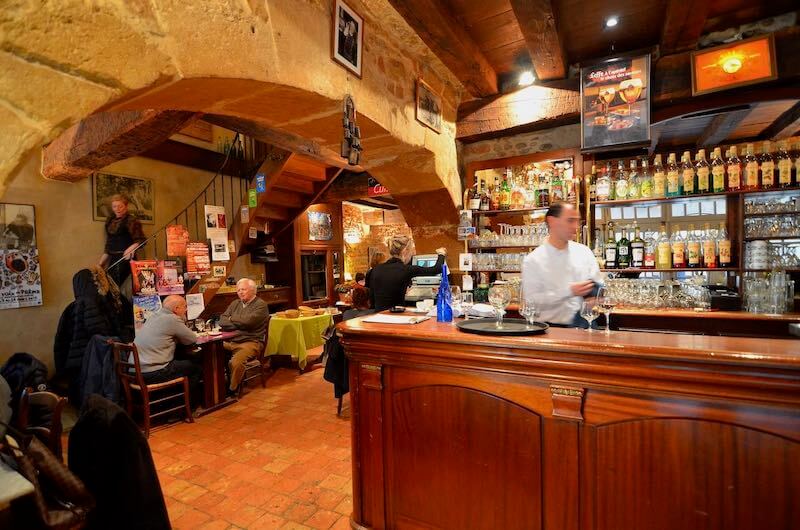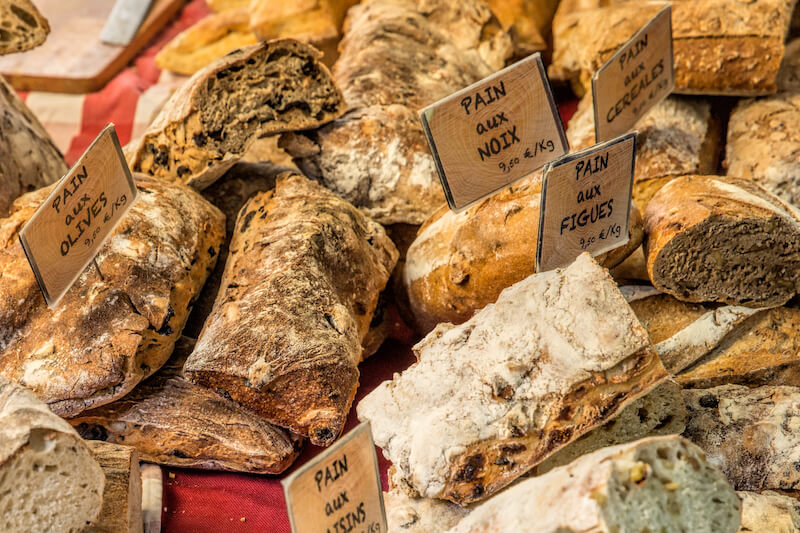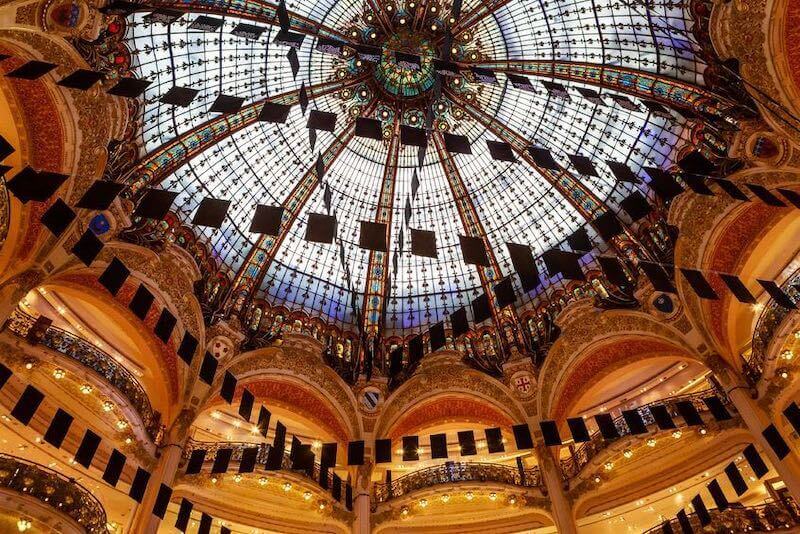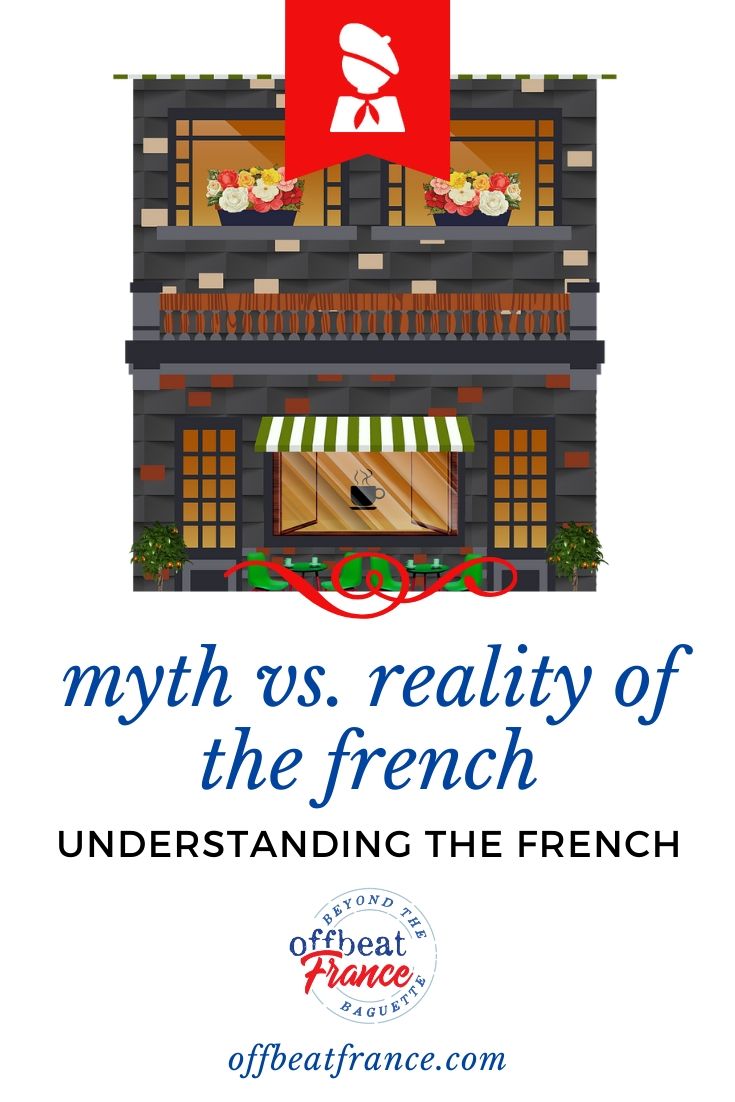Unsure about your French table manners? Click Here to download > > How to avoid these 10 food etiquette mistakes !
French People: Stereotypes and Myths
Published 15 August 2020 by Leyla Alyanak — Parisian by birth, Lyonnaise by adoption, historian by passion
So much has been written about French stereotypes... some of it wrong, but much of it uncomfortably close to home. Being French, I do fit in with many of these – but certainly not all.
The French being French, we disagree on most everything and succeed in confusing everyone, but there are a few bases for consensus: we are complex, our culture is rich, our history fascinating and our food (most of it, at least) delectable.
I am half-French and so I have the privilege of being only half confused. Let's look more closely at some of these French people stereotypes and determine which are true, which are outright lies planted by our historical enemies, and which are true-ish but we'd rather not admit it.
The French are arrogant
This is among the most common stereotypes of French people but is a bit unfair, as it lumps all French together. Parisians tend to behave more arrogantly than people from other parts of France, where you'll be surprised to find people are quite normal, possibly as familiar to you as your own.
And even this isn't quite true.
Parisians have made great efforts in recent years to be more welcoming and have, to widespread surprise, succeeded rather well.
Let's face it, if you're from a city like Paris, you could be forgiven a bit of one-upmanship, don't you think? And let's not forget, we French tend to believe we are better than most, wherever we're from.
Perhaps pride is mistaken for arrogance because the French are extremely proud of their country and won't abide any negative comments about it. This may be arrogant, or even rude, but... it IS.
The French are lousy tippers
Quite true, and with reason: the tips is already included in the bill.
A 15% service charge is usually added to your meal and distributed to your waiter or waitress. In France, restaurant staff make 'decent' salaries and do not live off their tips. That said, it is rather nice to round things up... but it's a gesture, not an obligation.
The only exception is when service is NOT included, in which case the menu will note it clearly: 'service non-compris'. In this case, in theory, you should leave a tip — because it is 'non compris', not included. I would leave 10%-12%.
 Generous yes, but not too generous
Generous yes, but not too generousHere's what a normal tip looks like when service is included: say your drink costs €2.80, and you'd like to leave a tip: round it up to €3. If your meal is €37, you can leave €40.
The more expensive your meal, the more you might consider leaving. But remember: it is NOT an obligation. Unlike in the USA, where a waiter might chase you down the street (as once happened to me) for not leaving enough.
Here, an oversized tip won't make you look generous – just odd. A really large tip might actually prompt a waiter to chase after you — thinking you've made a mistake.
Here's a quick guide to tipping in France.
The French always break the law
If you're talking about the car that speeds past you at 150 km/hr, then yes, absolutely. And if you mean avoiding paying for parking or other small infractions, then yes, we do try to circumvent the law.
But on big things, we tend to be law abiding, especially if there is a price to pay. The French broadly demonstrated obedience and courtesy during the Great Lockdown of 2020, sticking by the rules (helped of course by a massive police presence and hefty fines).
We will obey the law when there is a good reason to (like avoiding prison). The very rich and well connected, of course, play by a different set of rules, but that's not only in France... Plus, frankly, we have our share of weird laws so the urge to disobey is understandable.
The French are always on strike
This is no myth: it's true. I myself rarely fly Air France because each time I've done so, I've been delayed by a strike of pilots or aircraft mechanics or air traffic controllers.
That said, strikes are often predictable and workarounds can be found: people tend to walk off the job around holidays, to be as disruptive as possible but also because extending existing holidays by a few days is not at all unpleasant.
Plus, we love a good fight (think French Revolution). It's one of our endearing personality traits.
The French are good lovers
This one you must find out for yourself.
The French are sexy
The French attitude is that sex is a private matter and in any case, most French abhor talking about their personal lives.
What IS true is that the French aren't as hung up on sexual issues as are our Anglo-Saxon brothers and sisters. We don't take sex lightly, exactly, but we don't consider it such a major issue either. The same goes for nudity. It may be outrageous to you, but to us it's just normal (or at least used to be until our younger generations became more prudish).
That said, some surveys have determined that the French have more sex each year than any other nation. Indeed, many French men and women feel (and have felt for centuries) that adultery isn't all that bad as long as it doesn't hurt anyone and no one finds out. Or, as in the case of Voltaire, even if people DO find out.
We like to complicate things
We do. We also like to debate, and to contradict, sometimes with reason, but often just for the joy of intellectual exercise.
Read a newspaper in French and English and you'll immediately understand. An American or English news story will start with the most important fact, simply put, and will work backwards, with the story unfurling into its minor details.
A French-language story will bury the main point somewhere within the folds of an argument. Instead, the story will start with something witty or clever, the point being to use words wisely rather than to say what you mean. The (erroneous) assumption is that anyone with a brain should be able to read between the lines...
In reality, writing well probably carries more weight than providing information.
In the same vein, we tend to be abstract rather than concrete, with abstraction the more nuanced and therefore preferred approach. This, you see, provides us with more room for manoeuver, because we can shift along with the debate and adapt our arguments. Be concrete and you'll be locked into your position for life. How boring.
We prefer form over function
This leads on from the previous point, although it is not necessarily true.
We believe we measure up to our Germanic and Anglo-Saxon competitors with our technical savvy and industrial expertise and, when required, we can be precise and exact! But that doesn't stop us from wandering away from a technical discussion because a product's beauty or shape has caught our eye, a discussion that will inevitably end up heated, over lunch and halfway into the afternoon.
This is why beauty is so intrinsic to the French: we love it, in all shapes and forms, in art, in fashion and in ourselves. We don't have to look perfect, but we do have to look our best (a bit like Italians but with fewer hand gestures).
We are cultured and sophisticated
That depends completely on your definitions. If by culture you mean cultivation of the mind, the insistence on learning or knowledge and intellect, then yes, that tends to be true of a French person (well, SOME French people). We prize these qualities and do our utmost to show them off in ourselves.
Our fashion style and sophistication is innate, although modern times and comfort are rapidly taking over and we can be seen wearing Nikes on city streets. Not too often, thank heavens. We can look to the 17th century and the court of Louis XIV to trace our infatuation with beauty and sophistication. Since then, France, and especially Paris, has been a cultural leader within Europe and beyond.
But yes, we like culture (especially French culture) and beauty. Why wouldn't we?
We are deeply democratic but snobbish to the extreme
Absolutely. Everyone wants to be the boss, equally. Everyone wants to be right. Also equally.
Everyone wants equal time in the discussion. And everyone is the best.
Our rules of class and hierarchy are scrupulously defined, no matter how heatedly we might deny it. We know our place: our accent will betray us, with one arrondissement more worthy than another, with Paris lording it over smaller yet stunning cities, with the city classier than the countryside (unless you have a chateau in the provinces), and one region more attractive than another.
When Jean Castex (who is from the southwest of France) was recently chosen as France's Prime Minister, what dominated social media was talk of his accent, not his policies.
Yes, we are so formal we may speak to one another as strangers after having known one another for decades.
Test our democracy in a shop. Whereas in some countries the 'customer is king', in France the customer is barely the equal of the salesperson. If I, the sales clerk, am talking on my phone to a friend behind the counter, you will wait until I'm finished and finally ready to attend you. My conversation is, after all, at least as important as your question. If that displeases you, go elsewhere. I don't own the shop anyway — I just work here (and am underpaid whether I'm nice to you or not.)
Remember, the country's motto is "Liberté, Egalité, Fraternité." Egalité, or equality, is a strong contender for the top spot. Yet we never consider ourselves equal to others, we just believe in the principle. Go figure.
We are complainers
This is one of those French cliches that is sad but true, and oh how much has been written about this particular trait.
In fact, it has its own word, beyond complaining: râler, a cross between grumbling, bitching and moaning.
Let's face it, whatever delight we encounter is certain to have an underside that allows us some space for complaint. We are rarely satisfied, perhaps due to aspirations to perfection. The complaints aren't major – they are merely our way of hinting we (meaning YOU) can do better. But they are automatic and rare is the French exclamation of joy that isn't followed with a 'but'.
We tend to speak our minds
This is mostly true, but not always. It depends on the rapport de force, the balance of power. If we feel it is in our favor, we will immediately grab the higher ground and voice our opinion, often forcefully. If, on the other hand, we perceive we are in a less powerful position, we will bow gracefully and shut up while looking for leverage. What we don't do (yes, there are exceptions) is become violent. We can raise our voices and call each other names but usually we'll each get into our cars and drive off.
We don't like to talk about money
Absolutely correct. Money talk is crass. I don't want to know how much you make or how much your house cost. And if you ask me those questions, chances are it might be our last conversation, ever. As a child my mother always taught me that asking the price of something was rude. Clearly that's a bit outdated, but it does give you an idea of the ingrained reticence about dollars and cents. It also explains why we often cannot balance our budget and why we are hopeless at paying our taxes accurately.
We don't smile a lot
That's not true. We do smile, plenty. But when we have reason to. Say something witty and you'll see me grin from ear to ear. I just don't walk around the streets with a silly smile on my face. You may not think I'm nice. But frankly, I don't give a hoot. That's very French, by the way. On s'en fout! We don't give a toss!
France has the world's best health care system
This is one of those France stereotypes that was once true (a decade ago, the World Health Organization concluded we had the best health care) but is no longer. We've slipped a few notches but it's still better than many, something we witnessed during the COVID-19 epidemic, where the system somehow managed to hold together through a combination of robustness, decent leadership, the commitment of health workers and pure luck.
Our health system is available to all, and we like it that way. We don't quite understand why anyone could prefer a private system of lower quality and greater expense... You get sick, to go to the emergency or to see your doctor. You pay either nothing or very little, and would never get turned away from care for lack of funds. In other words, income is not a determinant in your health care, except for certain specialists, who are slightly more expensive (but still affordable) – you know the ones, the kind whose waiting rooms look like a page out of Vogue?
If you are foreign, you can still get medical care – your own country health plan or your private health insurance will reimburse you.
The problem will be finding care in English. In larger cities, this will be easier. Your hotel can find you someone, and your embassy or consulate can help. But if you're in a small town and have an emergency, ask anyone and everyone if they speak English. A nephew or colleague will probably be pressed into service for a bit of translation. Your health insurance should also have a hotline where you can reach an English-speaking doctor instantly. And as a last resort, use a translation app on your phone...
We don't do well when it comes to speaking English for health care, although specialists often keep up with science in English and, a bit of good news, more and more French are learning English every day!
But back to health care for a second: hospitals have been closing for budget reasons, some rural areas have no doctors at all, there aren't enough health care workers... so yes, we HAD a good health care system, but it's disappearing fast.
French drivers are insane
I've seen worse. And I've seen a LOT better.
We French do love our cars, but driving in France can be a nightmare if you don't do it right. But, it can also be a breeze. You'll need to learn a few rules, some of which seem to make no sense at all.
But do yourself a favour and read up on French driving rules before you try to drive here.
We dress with a certain "je ne sais quoi"
Whether it's Coco Chanel haute couture with high heels or a marinière striped shirt, we are considered stylish, elegant and well put together. And the French wear berets, of course!
Not that true, I'm afraid. We still dress up more than American cultures and anglophone countries when we go out, but the casual look is making rapid inroads. We may know how to tie a scarf but we also wear Converses to brave the cobblestones.
We are very formal
Oh, how true. Our polite formulas probably haven't changed much since the Ancien Regime, and the subtleties are such that no one raised outside France can make any sense of them. I read somewhere – and do agree – that while the English are encouraged to write the way they speak, we French are encouraged to speak the way we write.
Our everyday lives are governed by formality, from the way we greet one another (Monsieur, Madame) to how we speak to one another (the more formal 'vous' as opposed to the casual 'tu', which is perfectly acceptable among young people and close friends), to how we sign our letters. Even a short note ends with a swirl of a formula more suitable to Versailles than to modern-day Paris, along these lines: Kindly allow me, dear Sir/Madam, to present you with my most excellent wishes. Yes, it's a lot easier to sign off 'Sincerely Yours'.
That said, these strictures are all relaxed in the face of foreign visitors. You can't be expected to know every detail, can you...
We eat really strange foods
This is one of those French food stereotypes which is absolutely true. At least some people think they're weird... see for yourself.
But not everything we eat is odd and we do love good food: our culinary history is a long one and there is much to tell about our preferred dishes and our table manners.
Our specialties are rich and varied: bouillabaisse (fish soup) in Marseille, fondue in the Alps, choucroute (sauerkraut) in Alsace, foie gras in the southwest, oysters from Aquitaine or Brittany, Auvergne cheeses, croissants in Paris, Quiche Lorraine, cider from Normandy, escargots from Burgundy (yes, French snails), frog legs in my own region in eastern France... This is a tiny selection from the diversity of French regional foods, and each region, department, city or even village has its own specialty.
We also have universal foodstuffs, like French wine and beer and baguettes, and foods that have arrived with immigration, like pizza or kebabs. As you can see, we're are not as homogenous as you might think.
It's not just what we eat – it's also how we eat.
We drink a lot of wine
We do, more than any other country - the average French person drinks about 44.2 liters of wine a year. If you figure there are about 7 glasses in a liter, the average works out to 309 glasses of wine a year. That's less than one glass per day...
Let's compare: Australia drinks about half the amount we do, some 23.7 liters per person. The UK weights in at 20.2, New Zealand at 17, Canada at 12.5 and the USA at an extremely modest 10.4 liters per year, about a quarter of France's consumption. That said, I don't drink at all, and neither do a lot of people I know, or very little on special occasions. I'm not great at math but that means that the French average is actually... higher!
We are strong on manners
While some rules of eating are etched in stone (and have been since Louis XIV inaugurated Versailles), other rules are simply to be obeyed because - that's what Maman said we should do. Table manners are taken seriously here, and a faux pas at the table can set you back, socially of course, but even professionally, if you happen to be lunching with a prospective employer.
It's so easy to get it wrong... picking up certain foods with your hands (some are acceptable, like frogs' legs, and others are not, like chicken thighs), or eating noisily with your mouth open (don't expect to be invited back), or wearing your napkin around your neck (is anyone staring yet?)
And it's not just about eating.
We can be obsessed with manners but strangely so, considering we can also be unspeakably rude people. Perhaps not rude, but a little off-putting and standoffish enough to appear so.
Manners in general are considered important, at the table and beyond.
For example, if you walk into a shop or elevator where there are people, you must say Bonjour. It is simply the done thing. If you forget that and walk into your local boulangerie without acknowledging anyone, do expect to be ignored, or served most perfunctorily. You might even get cut off as you order with a pointed "Bonjour" from the saleslady. If not, the stony stares from fellow shoppers should alert you that some is very wrong...
 Don't forget to say Bonjour when you go buy your daily bread!
Don't forget to say Bonjour when you go buy your daily bread!Here's another example: speaking loudly. If I can clearly hear your conversation, you're being loud (we would say rude, but never to your face!)
Or if you call me by my first name before we know each other better (unless you're a millennial, in which case these rules go out the window because young people everywhere are less formal), or if you ask me a personal question, like how much I make (none of your business!) or how much my house cost (that too!).
France can be an obstacle course of manners but in the end, polite or not, we will forgive you because you are, after all, a foreigner in our land and we must be polite.
We are family focused
Indeed! While in many parts of the world shops are open on Sundays, in France this is a rarity, confined to the most touristed parts of Paris and the rest of the country. Otherwise, Sundays are sacred, not in a religious way but because it is when the family sits down to a Sunday lunch. Each time the issue of Sunday openings is raised by some hapless politician, the topic is slapped down by anyone desperate to protect their 'family time'.
This also speaks to quality of life. In some cultures, earning double overtime on Sundays is enough to encourage a healthy contingent of workers to set aside their weekends in return for the extra cash. Not so in France. While we will absolutely go on strike for more money, don't touch our Sundays! That is when we rest from the week. For the same reason, holidays too are venerated, not the ridiculous two or three weeks that some countries award, but a full six weeks of togetherness, where an extended family packs off together to their country house or rented holiday home or campground for a month.
We love our small shops
It's not that we hate shopping malls — in fact they're becoming ever more popular, and by their presence endangering our small-town and village shops.
We like to shop in our small-town businesses when we can, chatting with shopkeepers and getting that personal attention we cannot expect in large chain stores. (Just don't forget that essential Bonjour!)
For small purchases we still tend to pay cash, although most of us now have debit cards we can swipe for small purchases or use with a code for something larger. You may also be surprised at how many French still use checkbooks!
While mores are changing because more women work, traditionally, French women used to go to the shop every day to buy fresh produce and, of course, the proverbial baguette (except on weekends, when the men buy the baguette as an excuse to stop by the café for a quick drink with les potes, the buddies.)
Having a job outside the home means having less time to shop, and these days shopping is often confined to a Saturday supermarket excursion.
Weekend markets, however, still allow us to feel connected to our roots and somehow we trust the fresh fish and cheese wheels and just-picked fruit from the market more than we do the cellophane-wrapped products on supermarket shelves.
On weekends, we love to stroll through our brocantes, or flea markets, of which we have thousands.
 Ceiling of the Galeries Lafayette, France's most famous department store
Ceiling of the Galeries Lafayette, France's most famous department storeFrance has plenty of wonderful department stores, like the Galeries Lafayette, which you'll find in many large cities.
But we still love our shops...
Before you go...
If you enjoyed these stereotypes about French people, you might also like to read these other interesting facts about the French... Many of us come from different cultural backgrounds, shaped by French history and current events, and what some people call bad reputations are simply that, cultural differences.
Did you enjoy this article? I'd love if you shared it!





